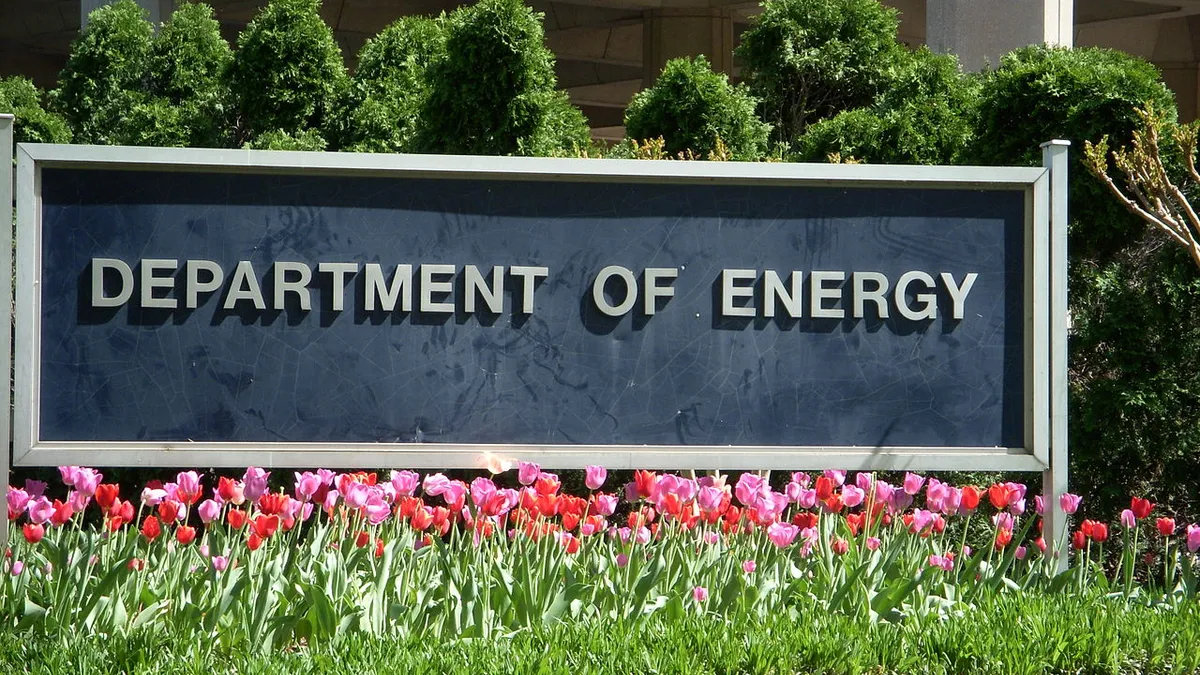Dive Brief:
- The Department of Energy (DOE) announced on Wednesday that a new project team led by GE Hitachi Nuclear Electric will develop three construction technologies that could be combined to reduce the cost of building new nuclear reactors by more than 10%.
- The project, focused on the application of advanced construction technologies, will receive $5.8 million in DOE funding. The team will also include the Tennessee Valley Authority (TVA), the first utility to secure an early siting permit for small modular nuclear reactors, according to the Chattanooga Times Free Press.
- Funded and managed through DOE's National Reactor Innovation Center, the project is technology agnostic and can be applied to a variety of advanced reactor designs, focused on bringing advanced reactor designs to market, according to the DOE's Office of Nuclear Energy.
Dive Insight:
DOE has funded a number of initiatives in recent years to encourage the development of advanced nuclear reactors, focusing on innovative technology development through demonstration projects. Analysts in the nuclear space see the latest award for construction research as a sign that the Biden administration will be focusing on issues outside of reactor development, including fuel questions.
"For the last several years, everything's focused on the reactor innovations, but now [DOE is] moving to the other innovations like the construction innovations or the fuel supply innovations," Nuclear Innovation Alliance (NIA) Project Manager Alex Gilbert said. "It's kind of like a chicken-and-egg problem, that to be able to supply fuel for a lot of these advanced reactors, you need to have a supplier, but until the reactors are actually ready to be loaded with fuel, there really isn't the demand for the orders yet."
NIA anticipates DOE to announce a request for information (RFI) on high-assay low-enriched uranium (HALEU). The DOE did not respond in time for publication about the timing of the RFI.
Several advanced nuclear reactors that are in the early stages of development would require HALEU fuel, which is enriched to a higher uranium content, compared with existing commercial reactors.
"By leveraging advanced construction technologies, we can drive down costs and speed the pace of advanced nuclear deployment – much needed steps to tackle global climate change and meet the President’s goal of net-zero carbon emissions by 2050," Kathryn Huff, acting assistant secretary for nuclear energy at DOE, said in a statement.
Advanced nuclear is being considered as a potential technology in deep decarbonization models, to help eliminate the last 10% to 20% of the power sector's emissions, Gilbert said.
However, recent nuclear construction efforts have a poor track record in the U.S., with the only reactor currently under construction continuing to face delays. Southern Company's Vogtle Unit 3 and Unit 4 are billions of dollar over budget and years delayed, but would be the first units completed since the TVA put its Watts Barr Unit 2 into service in 2016. Watts is the only new unit to have started operating in the last three decades.
"Construction costs and schedule overruns have plagued new nuclear builds for decades," Huff said.
Advanced nuclear could potentially avoid the pitfalls of recent larger nuclear reactors by achieving economies of scale on smaller, modular designs. Recent conventional reactors, on the other hand, have consistently been large, first-of-their-kind designs, which are more expensive, according to Gilbert.
"Historically, a lot of those very large designs were usually done by like one or two multinational corporations. So there are only really a handful of very large companies in this space," Gilbert said, adding that the advanced nuclear sector already has more participants, including many smaller companies.
The project team announced by DOE will test: a best practice from the tunneling industry to create vertical shafts, seeking to reduce construction schedules by more than a year; modular steel-concrete composite structures intended to reduce on-site labor costs; and advanced monitoring technology for nuclear power plants.
Gilbert said that initiatives like advanced monitoring, which will be focused on using digital twin technology, are broad enough that they are reactor-technology agnostic.
"That's something that will generally be applicable to most types of advanced reactors and ... we've seen a fair amount of work happen in that area recently," he said.
GE Hitachi will also work with Black & Veatch, the Electric Power Research Institute, Purdue University, Caunton Engineering, Modular Walling Systems Limited, University of North Carolina at Charlotte and the U.K.-based Nuclear Advanced Manufacturing Centre.














